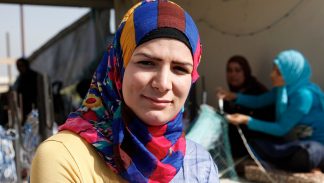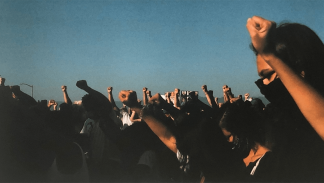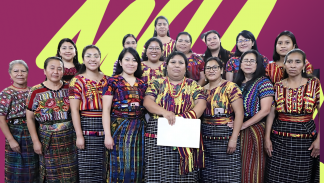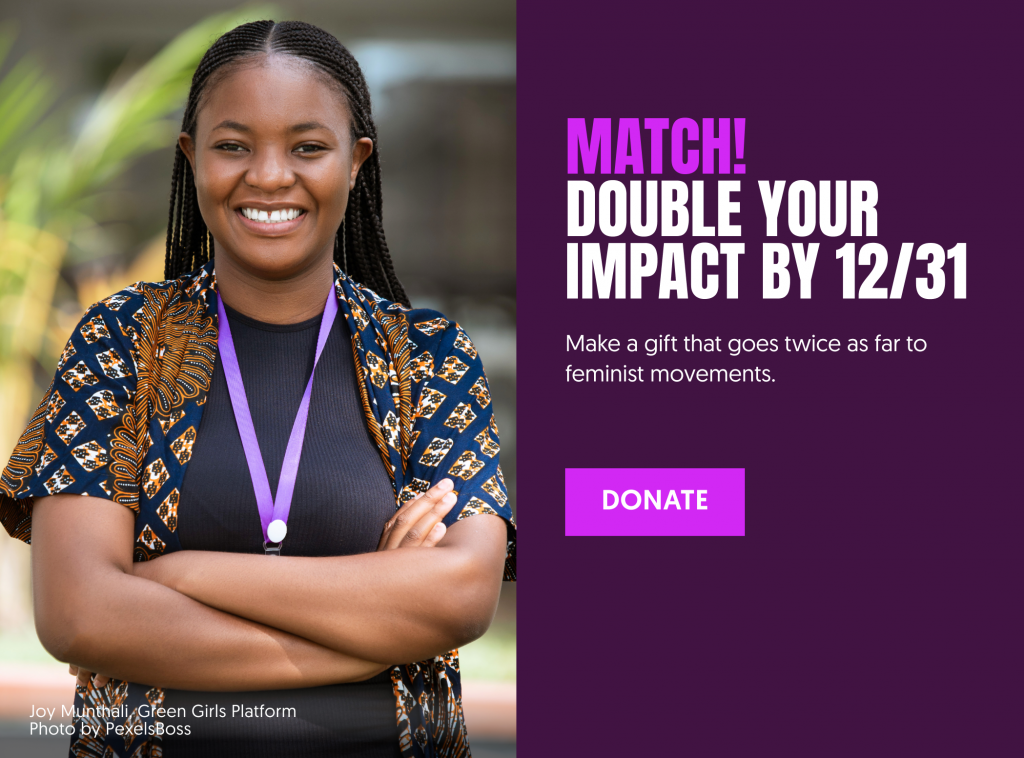Top 10 moments for women's rights in 2016: Inspiration for the year ahead
When you look back on 2016, what will you remember? It’s been a year filled with extreme highs and lows for women’s rights around the world. There have been rollbacks and new challenges for women and girls in countless countries, from the United States to Turkey and Brazil. As we look back on the past year, we are reminded of the undeniable power of women’s movements—because when women and girls come together, they are stronger, more effective in driving sustainable change, and better able to resist injustice, fear, and hate.
Join us in celebrating just a few of Global Fund for Women’s highlights for gender equality from the past year—including legal wins, major breakthroughs, and moments of resilience and strength. Let’s carry forward this inspiration into 2017 to make women’s movements more powerful than ever.
1. 21 girls returned home in Nigeria, with call to #BringBackOurGirls
In October 2016, 21 of the more than 200 girls who had been kidnapped from their school in Chibok, Nigeria in April 2014 by extremist group Boko Haram were released and returned home. Women and women’s groups, including Global Fund for Women partners, have been instrumental in leading the Bring Back Our Girls movement in Nigeria and have remained steadfast in their hope and determination. Women’s groups around the world have carried out protests outside embassies and have helped keep up pressure on the Nigerian government to ensure the return of all the girls, women, men, and boys kidnapped by Boko Haram. We will continue to fight for the release of the remaining Chibok girls and of all those who remain in Boko Haram’s captivity, and will continue to invest in girls’ education and rights.
“Boko Haram sees girls’ education as a threat simply because they are aware of the tremendous potential and power of an educated girl,” said Dr. Eleanor Nwadinobi, a longtime Global Fund for Women advisor in Nigeria, after the girls were released. “Those who seek to maintain the status quo see it as a threat, whereas those who know that the development of any country is boosted by educating girls, invest in girls’ education.”
2. Historic ruling for rape survivors in Guatemala
In the first successful prosecution for sexual violence committed during Guatemala’s military conflict from 1960-1996, a Guatemala court sentenced two former members of the military to a combined 360 years in jail in February 2016 for crimes against humanity. The two men were found guilty of holding 15 indigenous women in sexual and domestic slavery at the Sepur Zarco military base in northern Guatemala in the 1980s, and were also charged for murder and forced disappearance. Global Fund for Women grantee partner Unión de Mujeres Guatemaltecas, one of the oldest women’s rights organizations in Guatemala, helped the 15 indigenous q’qchís women survivors of sex and domestic slavery win this landmark case.
The trial marked a significant step toward ending widespread impunity for sexual violence in conflict around the world. “We the judges firmly believe the testimony of the women who were raped in Sepur Zarco,” said Yassmin Barrios, chief judge of the court. “Rape is an instrument or weapon of war. It is a way to attack the country, killing or raping the victims. The woman was seen as a military objective.”
3. Making strides for women leaders in Asia Pacific
This year, Global Fund for Women concluded the Funding Leadership and Opportunities for Women (FLOW) fund, a four-year $5.9 million initiative. With funding from the Ministry of Foreign Affairs of the Netherlands, we supported 139 organizations in 26 countries to empower women to tackle gender-based violence, increase their economic potential, and engage in political life. As a result, over 200,000 women developed leadership skills and over 5,000 were prepared to run for local office.
4. Women prevent a total ban on abortions in Poland…again
When a total ban on abortions was proposed by the government in early 2016, Global Fund for Women supported Federation for Women and Family Planning and ASTRA Network to help them build a powerful movement defending women’s reproductive rights. With crisis support provided in April, they built a broad coalition of women’s groups and other grassroots organizations across Poland to raise awareness about the threat to women’s health and human rights, and launch effective media campaigns to put pressure on the government throughout 2016 leading up to massive “Black Monday” strikes that led Poland’s parliament to withdraw the proposed legislation in October.
Hundreds of women and men wore all black, boycotted work and school, and took the streets in Warsaw, Gdansk, Wroclaw, and across the country to fight against the law that would make abortion illegal in any instance, with violations bringing a prison sentence of up to five years for women and their doctors. Just days after the mass protests, legislators voted against the proposal.
However, Polish women’s fight for control over their own bodies is far from over: since 1993, Poland has had one of the most restrictive abortion laws in Europe, with abortion only legal in cases of rape, incest, or life of the mother, and only within the first 12 weeks of a pregnancy. And this is not the first time a complete abortion ban has been proposed and rejected in Polish Parliament, most recently happening in 2015, 2013, and 2011—with the women’s movement there every step of the way.
5. Nothing can stop women activists in Egypt
Over the past year, Egyptian women’s resilience has been tested time and again amid an escalating crackdown on human rights and feminist spaces. Just last week, Azza Soliman, a bold Egyptian woman human rights defender and the founder of the Center for Egyptian Women’s Legal Assistance, was arrested by police officers with an arrest warrant signed by one of the judges overseeing the investigation of Egyptian human rights organizations. After hours of interrogation, Azza Soliman was released on bail—the best possible outcome, though far from the end. Her arrest came three weeks after authorities froze her personal and organizational assets, without a court hearing, and not long after she was banned from traveling.
In June, Mozn Hassan, Founder and Executive Director of Nazra for Feminist Studies in Egypt and a Global Fund for Women board member, was also officially banned from traveling by the Egyptian government—a common tactic used as part of judicial harassment against human rights defenders.
In April, El Nadeem Center for the Rehabilitation of the Victims of Violence and Torture—one of the only clinics in Egypt providing critical services to survivors of violence and torture—was raided by security forces for the second time in two months. The two bold directors, Dr. Magda Adly and Dr. Aida Seif El Dawla, refused to leave the premises while the police tried to evict them without showing an official closure order. And, the latest: Egyptian president al-Sisi is poised to sign a new bill on associations, which, if enacted, would give the government extraordinary powers over NGOs and would effectively end independent civil society in Egypt.
Despite the escalating harassment and government threats, women and women’s groups in Egypt remain more determined than ever to advance women’s rights.
In November, Mozn Hassan accepted the 2016 Right Livelihood Award on behalf of Nazra for Feminist Studies with a passionate speech. “This award is not only a recognition of Nazra’s work, it is a recognition of a century of feminist activism in our country that has inspired us and that we have sought to carry on as much as we can,” she said.
6. Women on the front lines of resistance in Brazil
“The message I want to get across from the women’s movement is that we have a goal for 2018: to have a feminist, progressive political agenda and to have women in leadership. And in order to get there, we all need to support the women’s movement.” – KK Verdade, Executive Director of ELAS Fund, the only women’s fund in Brazil and a longtime Global Fund for Women grantee partner.
We spoke with KK Verdade before the Summer Olympics in Rio to better understand the political and economic crisis in Brazil, following the impeachment of Dilma Rousseff and interim president Michel Temer’s conservative push and all-white, all-male Cabinet. The latest polls show growing disapproval of Temer’s leadership and, as KK Verdade pointed out, women are on the front lines, leading protests in Rio and throughout Brazil, and the women’s movement continues to fight against rollbacks in women’s rights proposed by the government.
The outbreak of the Zika virus in Brazil has put a spotlight on the country’s strict abortion laws. Global Fund for Women’s grantee partner SOS Corpo in Recife—the epicenter of the outbreak—is a leader in driving a national movement for sexual and reproductive health and rights. The crisis has opened a rare window of opportunity for the group to challenge religious fundamentalists and push for legal reform allowing women to decide over their bodies.
7. Haitian women lead recovery after Hurricane Matthew
“Women and girls are in a very difficult situation, catastrophic, almost apocalyptic. But the Haitian people, especially Haitian women, are very courageous. We know how to keep our head above water and we will continue to fight. For us, life is a perpetual struggle.” – (Marie) Michelle Vernet, Collectif Feminin Haitien pour la Participation Politique des Femmes (FANM YO LA), Global Fund for Women grantee partner.
In the face of severe destruction after Hurricane Matthew made landfall as a Category 4 storm in Haiti in October, women took quick action to lead recovery. Global Fund for Women’s grantee partners began to fill gaps in immediate relief and planned how best to meet the unique needs of women and children.
More than 200 people around the world met our call to support women in Haiti, raising nearly $40,000 for women-led groups in Haiti who have deep roots in their communities and are focused on driving sustainable change and empowering women. With money in the hands of Haitian women, though the need remains great, we feel hopeful for the rebuilding and recovery process, and for the future of Haitian women and girls.
8. Progress in Palestine to end violence against women
In June, the Ministry of Women’s Affairs in Palestine announced plans to establish the National Observatory on Violence Against Women in 2017, which will collect and document cases of violence against women for the first time—a significant step forward for Palestinian women. Global Fund for Women’s grantee partner Palestinian Working Women Society for Development, which has been working to advance women’s rights for 35 years, advocated for this new observatory to help curb disturbing rates of violence against Palestinian women. With the data collected by the observatory, Palestinian Working Women Society and other women’s groups are hopeful they will be able to better advocate for changes in laws and policies, raise awareness about violence against women, and help empower women survivors of violence.
“Having accurate information on violence against women will allow us to build up support to pressure Israel at the international level,” said Amal Khreisheh, general director of the Palestinian Working Women Society, in an interview with Al-Monitor. “At the regional level, we could use such information to launch a systemic advocacy campaign to place pressure on decision-makers to amend laws and policies and ensure protection for women.”
9. A small light of hope after deadly LGBTQI violence in Pakistan
Across the globe, people are being killed for being lesbian, gay, bisexual, transgender, queer, intersex (LGBTQI), or gender non-conforming; the deadly mass shooting at Pulse nightclub in Orlando, Florida in June was just one of many, mounting instances of violence against LGBTQI people around the world this year.
Violence is especially prevalent against those who are activists for the LGBT community. Twenty-three-year-old Pakistani transgender activist Alisha was shot nine times on May 23rd and died a week later because medical staff at one of the largest medical facilities in the northern Khyber Pakhtunkhwa province, Lady Reading Hospital, refused to provide medical attention and delayed treatment for more than 17 hours while they debated whether or not to place her in the ward for male or female patients.
Following Alisha’s death, Global Fund for Women’s grantee partner Blue Veins Pakistan joined with the TransAction Alliance in Khyber Pakhtunkhwa to carry forward her work for trans* rights—and achieved a critical policy win. “For the first time in the history of Pakistan, there will be government development schemes for the transgender community in Khyber Pakhtunkhwa,” Qamar Naseem, a gender equality and LGBTQI activist in Pakistan who is Program Coordinator of Blue Veins Pakistan, explained. “The government has announced that there will be separate wards in hospitals for the transgender community. This access to health care as well as to housing and protection in the new policy, we see as a great achievement.”
10. U.S. Global Strategy on Adolescent Girls carries promise for girls’ rights
In March 2016, Secretary of State John Kerry released the U.S. Global Strategy to Empower Adolescent Girls, which is a critical policy to empower girls around the world and protect their health and rights. Global Fund for Women partnered with the team behind the powerful film Difret in 2015 on a petition asking President Obama and the U.S. State Department for the release of the Girls Strategy and a comprehensive plan to address and end child marriage. Throughout the campaign, we generated 156,320 signatures on the petition, and delivered the petition and signatures to Ambassador Catherine Russell in September 2015—helping to drive the eventual release of the Global Strategy.
The next Administration must fully fund and implement this strategy in order for it to make a difference in the lives of girls and young women globally. We know that girls and young women are incredible changemakers with potential to change their communities and countries.
As we look back at these major breakthroughs for women’s rights around the world, we are determined not to go backwards. We know that social change and advancements in rights take time and courage. We must draw from the resilience of women’s movements around the world to move the needle on gender equality and stand up, get loud, and fight back in the face of harassment, hate, and rollbacks in rights. Let’s continue to work together to build women’s movements that are thriving, unified, and fearless across borders—so that at the end of 2017, we have even more to celebrate.
Take action to empower women's movements
As we look back at these major breakthroughs for women’s rights around the world, we are determined not to go backwards. Take action to help build women’s movements that are thriving, unified, and fearless across borders—so that at the end of 2017, we have even more to celebrate.



